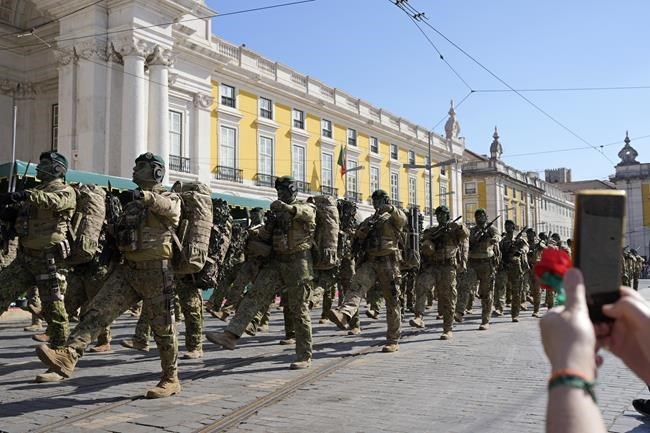
Portuguese paratroopers take part in a military parade at Lisbon's Comercio square, Thursday, April 25, 2024, during celebrations of the fiftieth anniversary of the Carnation Revolution. The April 25, 1974 revolution carried out by the army restored democracy in Portugal after 48 years of a fascist dictatorship. (AP Photo/Armando Franca)
Republished April 25, 2024 - 3:42 PM
Original Publication Date April 24, 2024 - 9:11 PM
LISBON, Portugal (AP) — Military vehicles and red carnations returned to the streets and squares of downtown Lisbon on Thursday as Portugal reenacted dramatic moments from the army coup that brought democracy to the country 50 years ago.
Tens of thousands of people attended the celebrations of the so-called Carnation Revolution, which ended a stifling four-decade dictatorship established by Antonio Salazar. It also paved the way for Portugal’s 1986 entry into the European Union, then called the European Economic Community.
At the time, the turmoil and political uncertainty in Portugal, a NATO member, caused alarm in Western capitals as the Portuguese Communist Party appeared poised to take power. Moderate parties, however, won at the ballot box.
Portugal's President Marcelo Rebelo de Sousa and Prime Minister Luis Montenegro presided over the colorful parade of troops and armored vehicles with many onlookers holding red carnation flowers, the symbol of the revolution. One child could be seen on top of an armored car holding a carnation.
Red carnations were plentiful at Portuguese stores and in street stalls in the spring of 1974 and people stuck them in the gun barrels of the insurrectionists.
Paulo Simões, 71, who took part in the uprising, said he was “living with a sense of duty fulfilled.”
“I have 2 children," he said. "I tried to instill in them the ideas of freedom, democracy, truth, honesty and I succeeded.”
Maria Monteiro, 68, the wife of a soldier who took part in the uprising, said she felt immensely emotional “for the freedom that we conquered, but we have to know how to defend it very well.”
During the day, troops and armored vehicles moved into a downtown square as part of a reenactment of one of the early stages of the uprising, when units took up planned positions at key places in the capital.
Soldiers also reenacted the insurrectionists' convergence on a paramilitary garrison in a jacaranda-dotted square called Largo do Carmo. That was where Marcelo Caetano, the Portuguese leader at the time, holed up and was surrounded by troops and jubilant civilians before surrendering.
Tens of thousands of people gathered for the annual afternoon march along the city’s main thoroughfare, the Avenida da Liberdade, or Freedom Avenue.
Simmering frustration with prolonged colonial wars against independence movements in Africa spurred the junior officers’ revolt, which succeeded in toppling the dictatorship in around 24 hours, with only five deaths.
Salazar, who died in 1970, clung to the African colonies long after other European powers had withdrawn from the continent and resisted modernizing his country amid Europe’s cultural changes of the 1960s.
Salazar’s rule ran through roughly the same period as Gen. Francisco Franco’s in neighboring Spain, though his time in power was far less bloody.
News from © The Associated Press, 2024